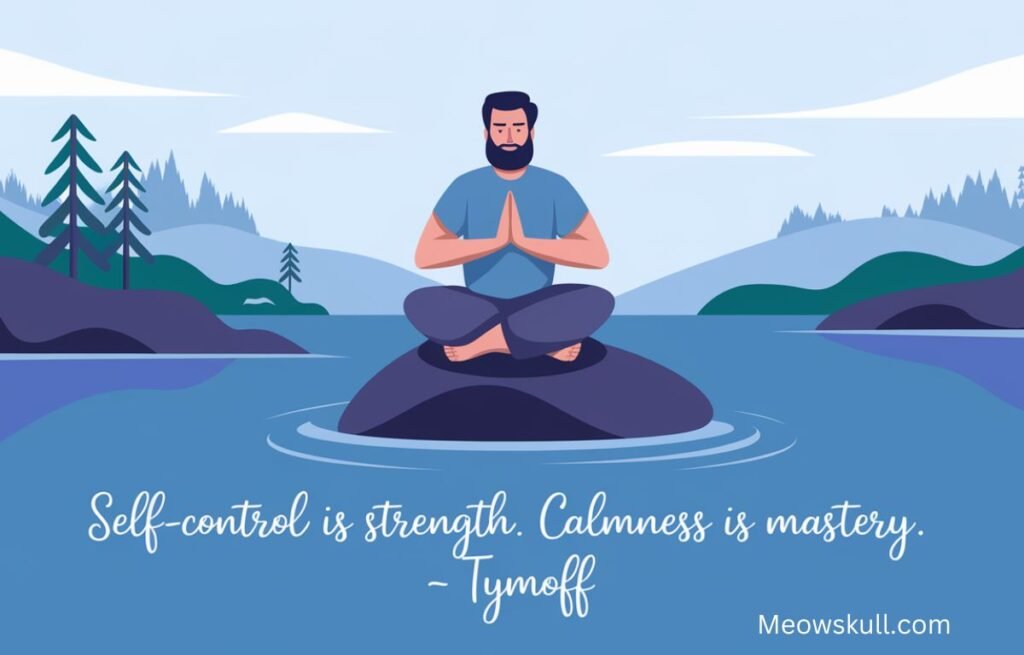The quote “Self-control is strength. Calmness is mastery. You – Tymoff” highlights two important traits: self-control and calmness. Self-control means having the ability to manage your actions and reactions. Calmness is about staying peaceful, even when things are difficult. Tymoff’s words remind us that these qualities can lead to a better and more balanced life.
When we have self-control, we can make better choices and avoid mistakes. Calmness helps us handle stress and challenges with ease. By practicing these traits, we can gain more control over our lives and achieve our goals. Tymoff’s philosophy encourages us to focus on inner strength and peace.
The Power of Self-Control
Self-control is the ability to manage your emotions, thoughts, and actions, especially in difficult situations. It gives you the strength to resist temptations and make decisions that are good for you in the long run. When you have self-control, you can stay focused on your goals and avoid distractions that might hold you back.
This trait is powerful because it helps you build discipline in all areas of your life. Whether it’s sticking to a healthy diet, working hard on a project, or controlling your temper, self-control is the key to success. By practicing self-control, you can create positive habits and make choices that lead to a happier, more fulfilled life.
Also Read: The ://vital-mag.net Blog: Key Features and Success
Self-Control in Decision Making

Self-control plays a crucial role in making good decisions. When faced with choices, it helps you think clearly and avoid impulsive actions. Instead of reacting quickly, self-control allows you to pause, consider the consequences, and choose the best option for your future.
Having self-control means you’re less likely to make decisions that you might regret later. Whether it’s managing your finances, relationships, or health, self-control ensures that your decisions align with your long-term goals. By practicing self-control in decision-making, you can steer your life in a positive direction and achieve lasting success.
Calmness as Mastery: What It Means
Calmness is the ability to stay peaceful and composed, even in stressful situations. It’s a form of mastery because it shows control over your emotions and reactions. When you are calm, you can think more clearly and handle challenges without being overwhelmed.
Being calm doesn’t mean ignoring problems; it means facing them with a steady mind. This calmness allows you to find solutions more effectively and avoid making hasty decisions. Mastering calmness can lead to better outcomes in both your personal and professional life, making it a valuable skill to develop.
The Connection Between Self-Control and Calmness
Self-control and calmness are closely linked, and together, they create a powerful combination. When you have self-control, it becomes easier to stay calm, even when things don’t go as planned. Self-control helps you manage your emotions, which in turn supports your ability to remain calm under pressure.
Calmness, on the other hand, enhances your self-control. When you are calm, you can think more clearly and make decisions that align with your goals. Together, self-control and calmness help you navigate life’s challenges with confidence and grace, leading to a more balanced and fulfilling life.
Also Read: Is a Flush Mount Ceiling Fan Right for You?
Practical Strategies to Develop Self-Control

Building self-control takes practice, but simple strategies can help. Start by setting small, achievable goals that challenge you to stay disciplined. For example, if you want to improve your diet, begin by cutting out one unhealthy snack at a time.
Another effective strategy is to avoid temptations. If you know something will test your self-control, try to stay away from it. Practicing mindfulness, like deep breathing or meditation, can also strengthen self-control by helping you stay focused and aware of your actions. By incorporating these habits into your daily routine, you can gradually build stronger self-control over time.
Cultivating Calmness in a Chaotic World
Staying calm in today’s fast-paced world can be challenging, but it’s essential for well-being. One way to cultivate calmness is by practicing mindfulness, which involves focusing on the present moment. Simple activities like deep breathing or taking a short walk can help you reset and stay calm.
Another method is to create a peaceful environment. Surround yourself with things that make you feel relaxed, such as soothing music or a quiet space. Limiting exposure to stressful news or social media can also help maintain your calm. By adopting these habits, you can develop a sense of calmness that will help you handle life’s challenges more effectively.
Real-Life Examples of Mastery Through Calmness
Many successful people demonstrate the power of calmness in their lives. For instance, athletes often use calmness to stay focused during high-pressure situations, leading to better performance. They practice staying calm to keep their minds clear and their bodies relaxed, which helps them make quick, effective decisions.
In the business world, leaders who remain calm during crises can guide their teams more effectively. Their calmness inspires confidence and allows them to think strategically, finding solutions to problems without panic. These real-life examples show that calmness isn’t just a personal strength but a key to mastering challenges in various areas of life.
Also Read: A Guide to Using a Warframe Sens Converter
The Role of Self-Awareness in Achieving Mastery

Self-awareness is crucial for developing both self-control and calmness. When you understand your emotions and triggers, you can better manage your reactions. This awareness allows you to pause and choose how to respond, rather than reacting impulsively.
Being self-aware also helps you recognize when you’re starting to feel stressed or overwhelmed. By noticing these feelings early, you can take steps to calm yourself before the situation escalates. Self-awareness, therefore, is the foundation for achieving mastery over your actions and emotions, leading to greater self-control and calmness in your life.
Conclusion: Embodying Tymoff’s Philosophy
Embracing Tymoff’s philosophy of self-control and calmness can transform your life. Self-control helps you make better decisions and stick to your goals, while calmness allows you to handle challenges with grace. Together, these traits lead to a more balanced and successful life.
By developing self-control and cultivating calmness, you can navigate life’s ups and downs more effectively. Practicing these qualities daily helps you achieve mastery over your actions and emotions, ultimately leading to a more fulfilling and peaceful life.
FAQs
What is self-control?
Self-control is the ability to manage your emotions, impulses, and actions. It involves resisting short-term temptations to achieve long-term goals. For example, it might mean avoiding distractions to stay focused on a project or resisting the urge to react angrily in a stressful situation.
How does self-control contribute to success?
Self-control helps you make better decisions by allowing you to resist immediate temptations and stay focused on your long-term goals. It enables you to persist through challenges and maintain discipline in various aspects of life, such as work, health, and relationships.
What does calmness as mastery mean?
Calmness as mastery refers to the ability to remain composed and steady, even in stressful or challenging situations. It means handling difficulties with a clear and relaxed mindset, which helps you think more clearly and make better decisions.
How can I practice self-control?
You can practice self-control by setting small, manageable goals and gradually increasing their difficulty. Techniques such as creating a plan, avoiding triggers, and developing new habits can also help. Regularly reflecting on your progress can further strengthen your self-control.
What are some ways to cultivate calmness?
To cultivate calmness, practice mindfulness techniques like deep breathing or meditation. Create a peaceful environment by reducing stressors and incorporating relaxing activities into your routine. Limiting exposure to stressful stimuli, such as negative news or social media, can also help maintain your calm.

As a seasoned contributor to “Meowskull”, Rosalie combines her linguistic prowess with a keen understanding of various topics, ensuring a delightful and informative reading experience. Her articles effortlessly blend clarity, creativity, and a touch of elegance, making language exploration an exciting journey for readers.